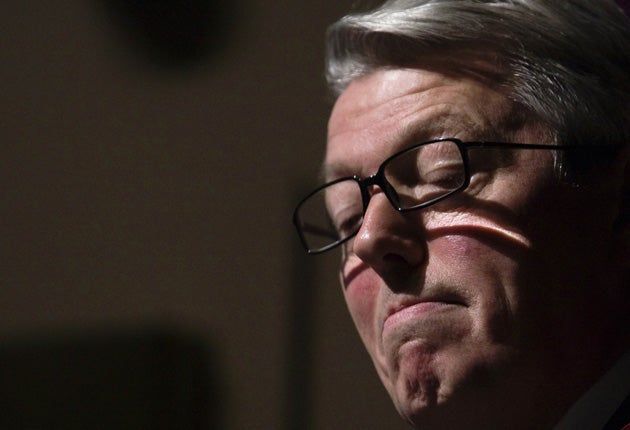Johnson under fire as more advisers threaten to resign
Decision to sack top drugs scientist threatens to tear apart council established in 1971

The future of the Government's scientific advisory council on illegal drugs hung in the balance last night as further resignations were threatened.
After four days of increasingly acrimonious exchanges between the Home Secretary, Alan Johnson, and the scientific establishment following the sacking of Professor David Nutt, the Advisory Council on the Misuse of Drugs which Professor Nutt chaired until Friday, broke its collective silence for the first time.
In a letter to Mr Johnson yesterday, the council said that while it had not been possible to contact all 28 remaining members – two resigned at the weekend – "it is clear that a majority of the council have serious concerns" about Professor Nutt's dismissal and the future of the council.
The letter said the case had "brought to the fore wider and pre-existing concerns among members about the role and treatment of the council". It added: "For some members these matters are of such seriousness as to raise the question whether they can, in good conscience, continue on the council. In this situation members wish for clarity and assurances about how the ministers view the council's advice and will view the council's advice in the future."
Mr Johnson proffered an olive branch in the shape of a promise to meet them "shortly" – possibly at their scheduled meeting next Monday – and praise for their work. In a statement to the Commons he said the advisory council, set up in 1971, had been "invaluable to the successive governments it has served". But he told MPs that he had "lost confidence in the professor's ability to be my principle adviser on drugs" because he had "acted in a way that undermined the Government rather than supporting its work".
The row erupted last week after Professor Nutt said the dangers of alcohol and tobacco were more serious than those posed by ecstasy and LSD and criticised the decision to move cannabis to Class B. It emerged yesterday that a review of the council's functions, planned before the present row erupted, is under way. But Mr Johnson said it was part of a routine Cabinet Office value-for-money review of non-departmental public bodies and not linked to Professor Nutt's departure.
Bitter criticism from scientists of the Government's role continued to flood in yesterday as the row escalated. Sir John Krebs, former head of the Food Standards Agency, said the Government operated a "pick and mix" approach to scientific advice. "When it suits the Government (for instance, on BSE in meat, badgers and bovine tuberculosis) ministers say they 'cannot make policy without the scientists – we have to go with what the scientists tell us'. If ministers reject science advice they should be completely open about why, and the advice itself should be totally public. There should be no gagging of scientific advisers.
"I cannot imagine any reputable scientist wanting to take on David Nutt's job with Alan Johnson as Secretary of State. All academics will think hard about offering their advice in such a regime. Without science advice the Government is compromised."
Opposition politicians were more muted in their criticism, refusing to attack Mr Johnson over the sacking of Professor Nutt, who is seen as a loose cannon because of his comparison of the dangers of ecstasy with riding a horse and similar remarks. The Tory leader David Cameron branded the row "very unseemly", and said there had been a "breakdown of confidence" between the Government and its advisers. But he said everyone who takes part in public life "has to think about what they are saying and the way they are saying it".
Mr Johnson was backed by Gordon Brown yesterday. But the Prime Minister came under fire from the former home secretary Charles Clarke, who said it had been wrong for the Prime Minister to say at the beginning of his premiership that he was going to change the classification of cannabis – from Class C to Class B – before the advisory committee had considered its position. "I think that was an error," said Mr Clarke.
Join our commenting forum
Join thought-provoking conversations, follow other Independent readers and see their replies
Comments
Bookmark popover
Removed from bookmarks